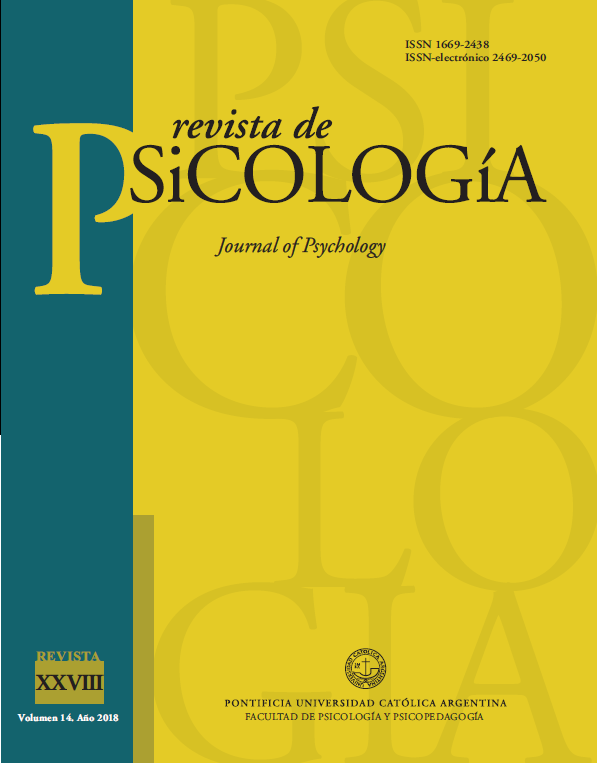Introductory aspects of the Self through a fractal model: configuration and intersection between stability and change in time, from a personality´ perspective
Keywords:
Self, fractal, complexity, emergent phenomena, psyche’s time.Abstract
The fractal conception of psychic time posed by Susie Vrobel is inspired by the phenomenology of Husserl’s time, and pre-sents certain characteristics that can be analyzed to the thought of Xavier Zubirí on this question. This fractal con-ception occurs in the complexity and differentiation of the details of temporal events. The vision of the Self from the perspective of the Personality, through the theory of non-linear dynamic systems (NDS), addresses a wealth of con-structs that re-describe the notions of stability and linear change over time, through self-organization, complexity, emerging phenomena, among others. The experience of time is postulated as an experience of affective intellection for the prospective psychic liberation.
Downloads
References
Allport, G. W. (1966). La Personalidad, su configuración y desarrollo Barcelona: Herder.
Almada R. (2008) Fenomenología y psicopatología del «tiempo vivido» en Eugéne Minkowski», disponible en http://www.robertoalmada.it/site
Aristóteles (2008). Metafísica. Madrid: Alianza Editorial.
Beláustegui, G.D. (2010). Representaciones interpersonales: Imágenes y huellas del Self. 2a. Ed. Buenos Aires: Educa.
Filloux, J.C. (1986). La Personalidad. Buenos Aires: Eudeba.
Frankl, V.E. (1997). Psicoanálisis y existencialismo. Buenos Aires: Fondo de Cultura Económica.
Guastello, S. J., Koopmans, M. & Pincus, D. (2009) Chaos and complexity in psychology: the theory of nonlinear dynamical
systems. New York: Cambridge University Press.
Herren G. (2002). Fractales (1ra ed.) Buenos Aires: Longseller.
Jackson W. J. (2004). Heaven´s fractal Net: retrieving lost visions in the humanities. Bloomington: Indiana University Press.
Jung, C. G. (1990). Las relaciones entre el yo y el inconsciente. Barcelona: Paidós, 1990.
Jung, C G. (1991). Arquetipos e inconsciente colectivo. Barcelona: Paidós ,1991.
Jung, C. G. (2003). Realidad del alma. Buenos Aires: Ed. Losada.
Jung, C. G. (2005). Tipos psicológicos. Buenos Aires: Editorial Sudamericana.
Karmiloff–Smith A. (1994). Más allá de la modularidad. La ciencia cognitiva desde la perspectiva del desarrollo. Madrid: Alianza Editorial.
Komar, E. (1967). El tiempo y la eternidad. Lecciones de antropología filosófica. Buenos Aires: Ediciones Sabiduría
Cristiana, 2003.
Lorenz, E. N. (1993). La esencia del caos. Madrid: Editorial Debate, 2000.
Mandelbrot, B. B. (1977). Fractals Form, chance, and dimension. San Francisco: W. H. Freeman and company.
Mandelbrot, B.B. (1997). La Geometría Fractal de la naturaleza. Barcelona: Tusquets Editores.
Marks-Tarlow T. (2008). Psyche´s Veil: psychoterapy, fractals and complexity. New York: Routledge.
Minkowski, E. (1995). El tiempo vivido. Fondo de Cultura Económica, México.
Naranjo, C. (1990) La vieja y novísima Gestalt. Chile: Cuatro vientos.
Osnajanski, N. (2012) El poder de los mandalas. Buenos Aires: Deva´s.
Popper, K. R.; Eccles, J.C.M. (1970). El yo y su cerebro. Barcelona: Labor Universitaria 1980.
Sheldrake, R. (1990). La presencia del pasado. Resonancia mórfica y hábitos de la naturaleza. Barcelona: Kairós,
Van Eenwyk, J.R. (1997). Archetypes & strange attractors. Toronto: Inner City Books, 1997.
von Bertalanffy L. (1968). General systems theory New York: Wiley.
Vrobel, S. (2011). Fractal Time. Why a Watched Kettle Never Boils. In Studies of nonlinear Phenomena in Life Science. Vol. 14. Singapore: World Scientific Publishing Co.
Wymore, A. W. (1967). A mathematical theory of systems engineering. New York: Wiley.
Zubiri, X. (1996). Espacio, tiempo, materia. Madrid: Alianza Editorial.
Downloads
Published
How to Cite
Issue
Section
License














